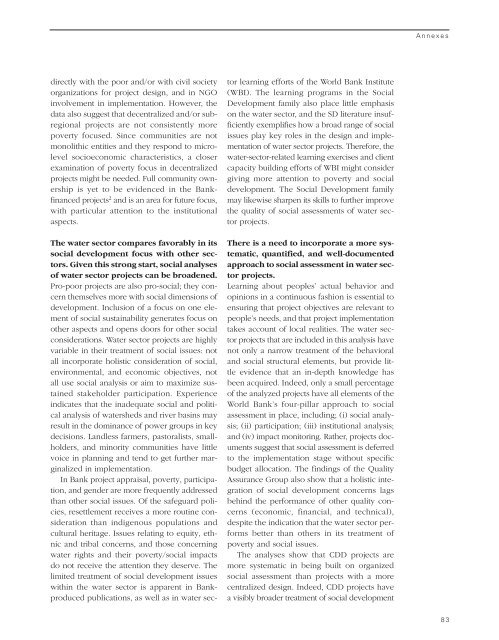Download Report - Independent Evaluation Group - World Bank
Download Report - Independent Evaluation Group - World Bank
Download Report - Independent Evaluation Group - World Bank
Create successful ePaper yourself
Turn your PDF publications into a flip-book with our unique Google optimized e-Paper software.
Annexesdirectly with the poor and/or with civil societyorganizations for project design, and in NGOinvolvement in implementation. However, thedata also suggest that decentralized and/or subregionalprojects are not consistently morepoverty focused. Since communities are notmonolithic entities and they respond to microlevelsocioeconomic characteristics, a closerexamination of poverty focus in decentralizedprojects might be needed. Full community ownershipis yet to be evidenced in the <strong>Bank</strong>financedprojects 2 and is an area for future focus,with particular attention to the institutionalaspects.The water sector compares favorably in itssocial development focus with other sectors.Given this strong start, social analysesof water sector projects can be broadened.Pro-poor projects are also pro-social; they concernthemselves more with social dimensions ofdevelopment. Inclusion of a focus on one elementof social sustainability generates focus onother aspects and opens doors for other socialconsiderations. Water sector projects are highlyvariable in their treatment of social issues: notall incorporate holistic consideration of social,environmental, and economic objectives, notall use social analysis or aim to maximize sustainedstakeholder participation. Experienceindicates that the inadequate social and politicalanalysis of watersheds and river basins mayresult in the dominance of power groups in keydecisions. Landless farmers, pastoralists, smallholders,and minority communities have littlevoice in planning and tend to get further marginalizedin implementation.In <strong>Bank</strong> project appraisal, poverty, participation,and gender are more frequently addressedthan other social issues. Of the safeguard policies,resettlement receives a more routine considerationthan indigenous populations andcultural heritage. Issues relating to equity, ethnicand tribal concerns, and those concerningwater rights and their poverty/social impactsdo not receive the attention they deserve. Thelimited treatment of social development issueswithin the water sector is apparent in <strong>Bank</strong>producedpublications, as well as in water sectorlearning efforts of the <strong>World</strong> <strong>Bank</strong> Institute(WBI). The learning programs in the SocialDevelopment family also place little emphasison the water sector, and the SD literature insufficientlyexemplifies how a broad range of socialissues play key roles in the design and implementationof water sector projects. Therefore, thewater-sector-related learning exercises and clientcapacity building efforts of WBI might considergiving more attention to poverty and socialdevelopment. The Social Development familymay likewise sharpen its skills to further improvethe quality of social assessments of water sectorprojects.There is a need to incorporate a more systematic,quantified, and well-documentedapproach to social assessment in water sectorprojects.Learning about peoples’ actual behavior andopinions in a continuous fashion is essential toensuring that project objectives are relevant topeople’s needs, and that project implementationtakes account of local realities. The water sectorprojects that are included in this analysis havenot only a narrow treatment of the behavioraland social structural elements, but provide littleevidence that an in-depth knowledge hasbeen acquired. Indeed, only a small percentageof the analyzed projects have all elements of the<strong>World</strong> <strong>Bank</strong>’s four-pillar approach to socialassessment in place, including; (i) social analysis;(ii) participation; (iii) institutional analysis;and (iv) impact monitoring. Rather, projects documentssuggest that social assessment is deferredto the implementation stage without specificbudget allocation. The findings of the QualityAssurance <strong>Group</strong> also show that a holistic integrationof social development concerns lagsbehind the performance of other quality concerns(economic, financial, and technical),despite the indication that the water sector performsbetter than others in its treatment ofpoverty and social issues.The analyses show that CDD projects aremore systematic in being built on organizedsocial assessment than projects with a morecentralized design. Indeed, CDD projects havea visibly broader treatment of social development83
















